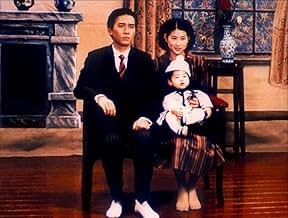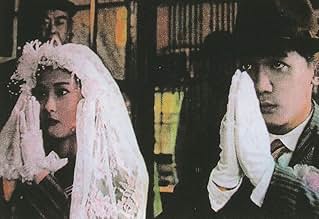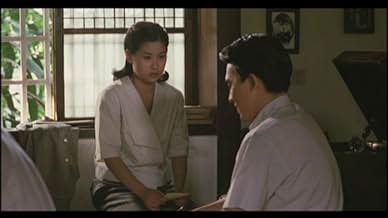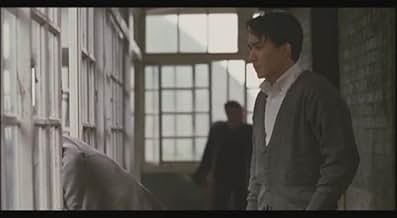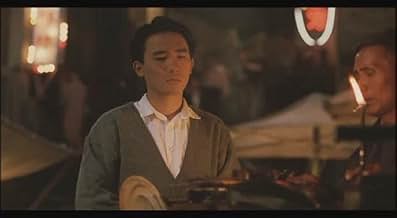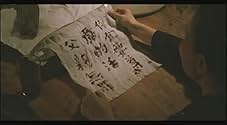IMDb RATING
7.8/10
6.6K
YOUR RATING
The story of a family embroiled in the "White Terror" that was wrought on the Taiwanese people by the Kuomintang government after their arrival from mainland China in the late 1940s.The story of a family embroiled in the "White Terror" that was wrought on the Taiwanese people by the Kuomintang government after their arrival from mainland China in the late 1940s.The story of a family embroiled in the "White Terror" that was wrought on the Taiwanese people by the Kuomintang government after their arrival from mainland China in the late 1940s.
- Awards
- 8 wins & 6 nominations total
Tony Leung Chiu-wai
- Wen-ching
- (as Tony Chiu Wai Leung)
Tien-Lu Li
- Ah-lu
- (as Tian-Lu Li)
Featured reviews
A previous poster described this film as a Taiwanese Godfather, but better. Indeed, this film has a lot similarities to godfather, in which the most notable is the condensation of an entire nation into the life of one single family. Even though I never really come to love other Hou's films, City of Sadness is a flawless epic that truthfully depict an era that is forgotten by most of my generation. I have heard those stories from my paternal grandparents, who are like people portrait in the film, grass root Taiwanese. I have also heard stories from my maternal grandparents, who are the late comers from mainland China. The entire different perspectives surprised me that in such a small nation, mistrust is still profoundly rooted and transmitted via generations. City of Sadness portraits this image so hauntingly and yet with beautiful and quiet transcendence seeing the turmoil through the eyes of the deaf and mute son of the Lin family. Taiwan, the city of sadness, is eternally sorrowful because of its rootlessness, which until today, still runs in my blood.
A movie beyond its cinematic presence, but matters also the director's outlook and the audience's interpretation - in plain words, you would give it a much higher rating if someone explains you it's historical context. Surprisingly, I find Tony Leung's performance in this film decent and slightly bland, maybe because his other works are simply too good, or maybe the performance of this movie across the board is all too flawless. As the eldest son myself, I specifically appreciated the character Wen-heung, a boisterous, truculent, and rugged man, yet also interestingly a child carer, a family adhesive, and a natural leader, whose unconstrained aggression engenders one's own tragedy. Regarding the movie itself, non-linear editing, picturesque sceneries, and long, still frames generate versatile atmospheres with a unique artistry. Also a historic fiction, the film gradually unravels an era of generational trauma using convoluted storylines and symbolic characters. In times of turmoil, perhaps it would be better if we are as deaf as Wen-ching or as bewildered as Wen-leung, like yielding grass that lives through scything gales. Definitely one of the most important chinese cinematic tribute worthy of deep-dive analyses and global recognition.
Hou Hsiou-Hsien's "A City of Sadness" is one of Oriental Cinema's most rewarding challenges. I have returned to it several times, always with a sense of awe, understanding it a little more on each occasion but still not always sure what is actually happening on the screen. Although this makes the experience sometimes frustrating, the miracle is that it never detracts from the gut feeling I have had from the very first viewing that I am watching a masterpiece. An ambitious attempt to capture the immediate post second world war period of Taiwanese history by following the members of one family through fragments of their daily lives rather than a carefully constructed continuous narrative, Hou's work resonates with tremendous feeling. As is usual with this director, the audience has to work hard to supply connections in a film without joins, in order to understand who is who and what is actually going on. I have to admit that some of the scenes of gang violence still elude me, but, these apart, the light is beginning to shine through. It is clear that the old man with the beret who sits often staring vacantly is the owner of that densely furnished restaurant; that he has four sons. The eldest, the sturdy looking one, seems perennially mixed up with figures of a gangster underworld, the second has returned from the war mentally damaged, the third did not return from active service in the Phillipines and is presumed dead. And then there is the youngest who has a photographer's studio and seems completely apart from the rest of the family by virtue of a sensitive, gentle nature and the disability of complete deafness brought on by a childhood accident. It is his fortunes and those of the young nurse he eventually marries that provide the sense of audience empathy that even the most obscure cinema need in order to work its magic. Their scenes provide moments of great tenderness in a relationship that relies entirely for communication on the written note such as the occasion when she needs to tell him about the beauty of a German folksong that is being played. When the country is placed under repressive martial law with massed executions for dissenters we have snippets of the deaf mute's experiences. There is a particularly telling moment when he is in captivity, unable to hear the sound of the firing squad from which he somehow mercifully escapes. In "A City of Sadness" it is short scenes such as this that one remembers so vividly. That it provides the experience of a sweeping epic without recourse to any great scenes of action is both its mystery and fascination.
This is the only one of Hou Hsiao-hsien's films I caught at a retrospective of his work, and it's a tragedy because this film is so incredibly good. Hou's rigorous formal approach (highly geometrical framing, repetitive shots along axes, distinctive use of lived-in colors) provides a framework for the film to operate within its own world. Whereas Coppola's "Godfather" goes this way and that, without a significant coherence, visually or rhythmically, "City of Sadness" feels like an elegy to Taiwan and the family (in much the same way that "Underground" is an ode to what was once Yugoslavia). At times funny, sorrowful, and invigorating, I suppose that what makes this film so special is that it refuses to operate in "big moments" and focuses, like Ozu (who Hou is often compared to) on the little events that make life what it really is.
10darii73
Simply one of the best films ever made and certainly the best to have come out of China, Taiwan or Hong Kong. Forget about traumatic Taiwanese history, forget about other "epic" films from mainland China, or Taiwan, or Hong Kong. This one is one of the most profound statements about human condition and the relentless power of history. You can physically feel the winds of history blowing through a small hospital in the mountains, or a house of the person who will succumb to the inevitable, or a railway car caught in the middle of a massacre. Hou Hsiao-Hsien doesn't reconstruct history, he shows you human beings caught unawares and unable to cope with a totally unexpected avalanche of events destined to change their lives. Acting is superb, the mute character played by Tony Leung Chiu Wai (who, quite prosaically, couldn't speak Hokkien and had to be made mute) will haunt you for a very long time. One of the most underrated films from one of the most underrated directors. Spend two and a half hours of your life watching this, it's worth it. 10 out of 10.
Did you know
- TriviaIn 1989, Hou Hsiao-hsien's A City of Sadness, the first film to touch on the 228 Incident, a taboo subject in Taiwan, became a big hit in the theaters. As a result Jioufen, where the film was set, revived due to the film's popularity. The nostalgic scenery of Jioufen as seen in the film, as well as appearances in other media, charmed many people into visiting Jioufen. For the beginning of the 90s, Jioufen experienced a tourist boom that has shaped the town as a tourist attraction. Soon retro-Chinese style cafés, tea houses, and souvenir stores bearing the name "City of Sadness" were built.
- ConnectionsFeatured in When Cinema Reflects the Times: Hou Hsiao-Hsien and Edward Yang (1993)
- How long is A City of Sadness?Powered by Alexa
Details
Box office
- Gross worldwide
- $143,169
Contribute to this page
Suggest an edit or add missing content


